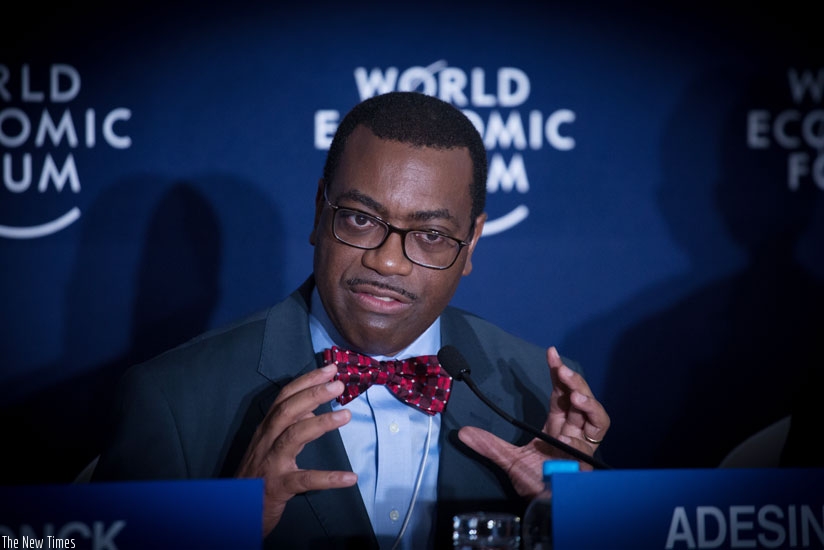The African Development Bank is working on giving Nigeria loan facilities of $4.1bn between now and next year for critical sectors of the economy.
The loans include $1bn at a concessionary interest rate of 1.2 per cent for Nigeria to address the 2016 budget deficit and aid her economic recovery.
The President, AfDB, Dr. Akinwunmi Adesina, disclosed this to State House correspondents on Monday after a meeting with Vice President Yemi Osinbajo and other members of the Economic Management Team at the Presidential Villa, Abuja.
According to the AfDB president, the package includes; $1bn in budget support, $300m to create jobs for 185,000 youths, $250m towards infrastructure development in the North-East, $1m grant to deal with challenges of Internally Displaced Persons, $300m for infrastructure development around Abuja, and $200m for the Transmission Company of Nigeria to improve its facilities, among others.
Stressing that Nigeria was the largest shareholder in the bank, Adesina said that the bank was in the country to offer its support in the face of the current tough times.
He said, “I think the times are difficult but I want to commend the government for being bold in taking the right decisions. I think that the fact that the price of crude oil has gone down is a big challenge, because you have 98 per cent external forex revenue coming from the sector.
“So, it has created calibrations; I’m not going to go into the details of all the problems, but what is important is what we are going to do about it.
“I’m not here to lecture the Nigerian government. I’m here to support very strongly. We have said that we are going to support the Nigerian government with the budget support to be able to deal with some of the fiscal imbalances that they have. We are looking to consider for an award of $1bn to help to deal with that particular deficit.”
Adesina added that the bank would help to revive Nigeria’s economy, especially by deepening the level of diversification in critical sectors such as agriculture, solid minerals and manufacturing.
According to him, the bank is going to provide in total $4.1bn to Nigeria between 2016 and 2017 for power, infrastructure, agriculture and for the private sector, including financing and lending to the Small and Medium-scale Enterprises.
He also said that he expected the AfDB portfolio in the country to grow to $10bn by 2019.
Adesina, a former Nigerian Minister of Agriculture, added, “We also recognise that power is perhaps the most important challenge that is driving inflation in the country. So, we expect in our portfolio this year to invest in a total of 1,400 megawatts of power to focus on the energy sector; and by 2017, we plan to add 1,387 megawatts to the sector.”
He said that the bank also discussed with Osinbajo and the Minister of Finance, Kemi Adeosun, on how to invest in areas of women and youth employment in the country as well as to look for opportunities to support access to finance by supporting the Development Bank of Nigeria with $500m, which will help to provide cheap financing for the real sector that the country wants to grow.
According to him, the bank is also providing $100m to the Bank of Industry to enable it to lend to small and medium-sized enterprises.
Adesina said, “Let me just say that Nigeria is experiencing tough times, but Nigeria is not falling apart; and when people talk about debt crisis, Nigeria is not in a debt crisis. If you look at the fiscal deficit of this country with regard to the GDP, it is about three or 3.5 per cent. It is still way below the five per cent recommended by the Fiscal Responsibility Act.
“If you look in terms of the debt to the GDP ratio for Nigeria, it is 15 per cent. So, there is no debt crisis in Nigeria; what you have is liquidity problem and we are trying for the country to be able to drive down inflation and to be able to make sure we are working with the government to be able to provide incentives for the private sector.
“Because to come out of recession you need more than the government, you need the private sector. So, incentives are very important. The Finance minister talked about a whole lot of incentives that they are going to give and I think that is the right way to go.
“Nigeria will come out of this as a better and more diversified economy than before it went into the recession.”
Also speaking, Adeosun said there was no need to fear over the new loan as it would be put into good use, adding that the government was not over-borrowing.
She added, “And as Dr. Adesina said, we are looking unto them with $1bn budget support; but beyond that, there are lots of loans and initiatives around agriculture, job creation for the youths, solid minerals, women empowerment and women’s access to finance, and access to finance by the SMEs.
“We are not over-borrowing, what we are trying to do is to ensure that this money we are borrowing we use it on the key infrastructure that will drive the economy.”

 Naira4 weeks ago
Naira4 weeks ago
 News4 weeks ago
News4 weeks ago
 Naira4 weeks ago
Naira4 weeks ago
 Jobs4 weeks ago
Jobs4 weeks ago
 Naira3 weeks ago
Naira3 weeks ago
 Travel3 weeks ago
Travel3 weeks ago
 Naira3 weeks ago
Naira3 weeks ago
 Investment4 weeks ago
Investment4 weeks ago






























